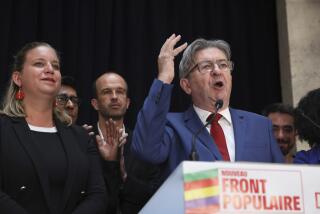Algerians Brave Militant Threats to Cast Ballots
- Share via
ALGIERS — Showing more a sense of desperation than faith that their country’s agony would be eased, more than half of Algeria’s eligible voters braved threats from Islamic militants to cast ballots Thursday for the country’s first multi-party parliament.
But the election was marred by a few incidents of violence and accusations of intimidation against parties critical of the government. Even before the counting began, some opposition leaders warned of widespread vote fraud.
A massive security blanket--including more than 300,000 police and army troops deployed nationwide and the clearing away of almost all parked vehicles from central Algiers--left the country looking like an occupied zone. But it succeeded in keeping Islamic extremists from staging any major disruption of voting.
Despite the problems, opposition politicians said they viewed the election as at least a step toward normality. “For us it is a way to lessen a bit the heavy grip that’s on us,” said Workers’ Party leader Louisa Hanoune, whose leftist party is urging the government to resume dialogue with the Islamic militants opposed to it.
The vote was to elect a new 380-member National People’s Assembly, the first multi-party parliament since Algeria gained independence from France in 1962. Results were expected late today.
The government portrayed the vote as a turning point to end five years of political violence and terrorism that have killed more than 60,000 people in this country of 28.6 million. The violence, which has escalated to include death-squad hits by government troops and mass throat-slitting by Islamic militants, began after generals stepped in to cancel a 1992 election.
The prospective winner of the 1992 vote, the Islamic Salvation Front, was barred from participating this time.
As of 6 p.m., Interior Minister Mustapha Benmansour said, more than 9 million had turned out--slightly more than 56% of the electorate. It was lower than turnouts both in the first round of aborted elections and in the vote that made retired army Gen. Liamine Zeroual president in 1995.
Government officials expressed satisfaction with Thursday’s voting. But voters appeared to have been spurred more by a sense of duty than by enthusiasm. Those who spoke to journalists frequently hesitated to give their names and glanced nervously about to see who might be listening.
“We live under threat, waiting for death to come to us at any moment, and this is why we are voting,” a female voter said as she emerged from a polling station in Algiers. “The main thing is to stop the bloodshed.”
“I just armed myself with a lot of courage and trust in God,” said another woman as she voted in the capital’s old Casbah quarter, a bastion for Islamist groups that sought an election boycott.
The election may not be perfect, but “we have to do our best,” said Mohammed Belaud, a gardener. “My deepest hope is to see the country coming back to normal as before and to be able to go out at night without fear.”
More than 100 international observers--including 14 Americans under United Nations auspices--were in Algeria to observe the voting. In their initial comments, they hesitated to credit it as free and fair.
The voters were congratulated by State Department spokesman Nicholas Burns in Washington. “What is clear to us is that the Algerian people are showing courage by voting in very large numbers, including a very large number of women who are seen to be voting,” he said.
A leader of the main legal Islamist party, the Movement for a Peaceful Society, said there had been many irregularities nationwide. Poll watchers from his party were barred from observing voting--and some had even been shot at. In some places, he said, the party’s ballots were torn--making them invalid--or were missing from polling stations.
Two election observers from the same party were wounded when a bomb went off in a car near the central city of Djelfa, Reuters news agency reported.
“We members of different parties knew we would have to go through this. This election is taking place in a war atmosphere,” said Hanoune, one of the candidates who was most outspoken in her criticism of the government.
“But still we decided we had to participate, to put on the table the question of peace.”
More to Read
Sign up for Essential California
The most important California stories and recommendations in your inbox every morning.
You may occasionally receive promotional content from the Los Angeles Times.










